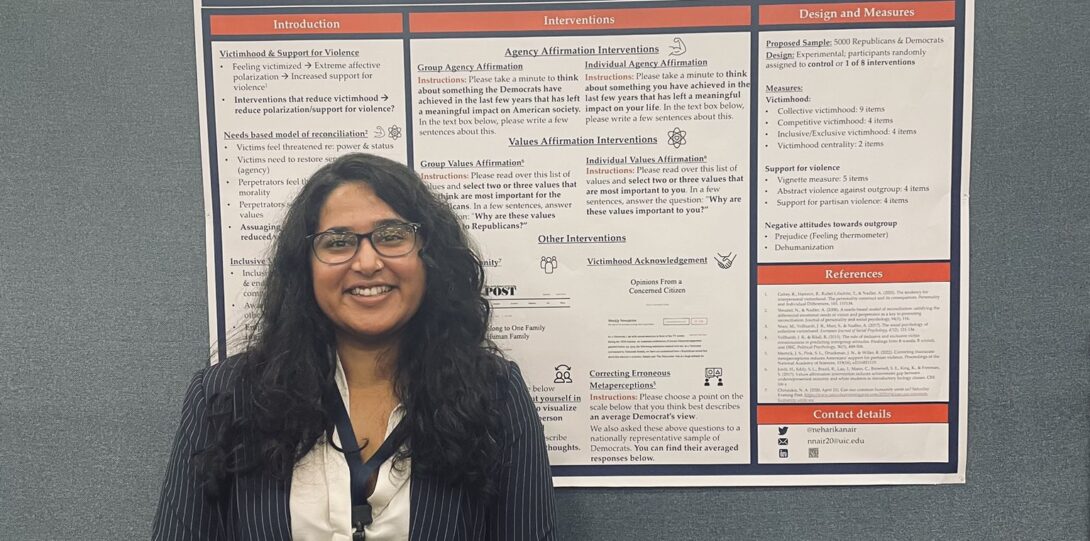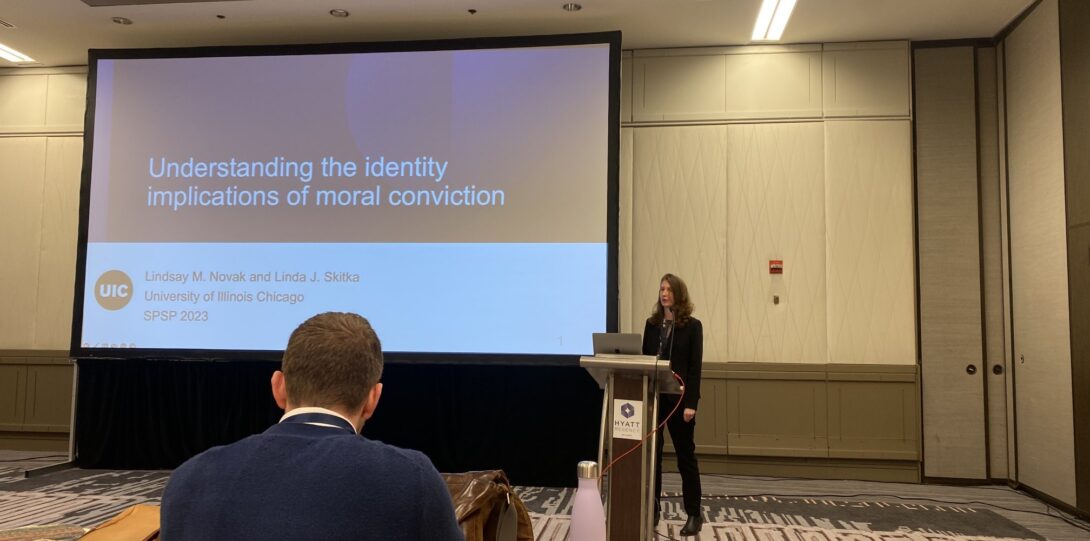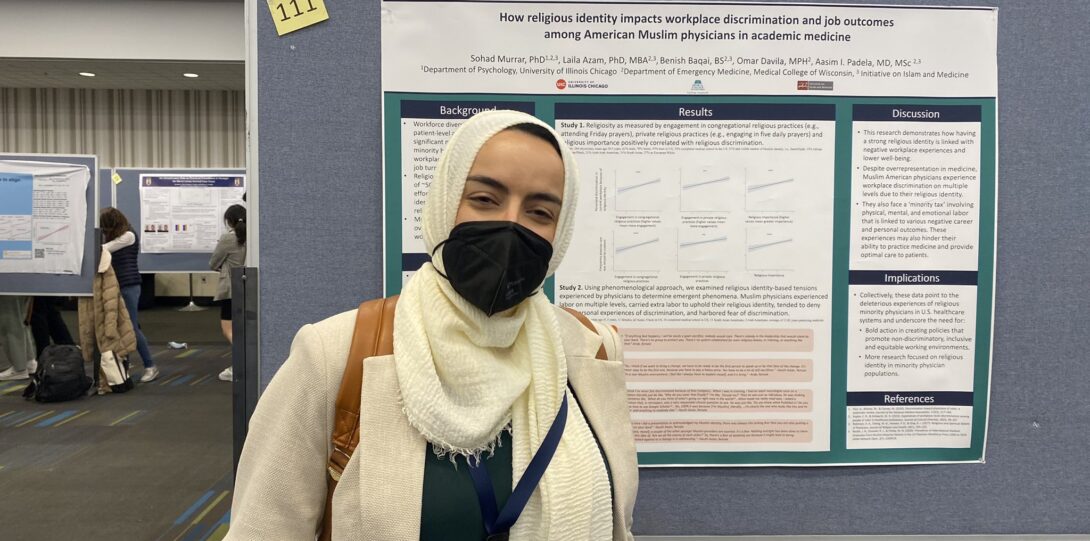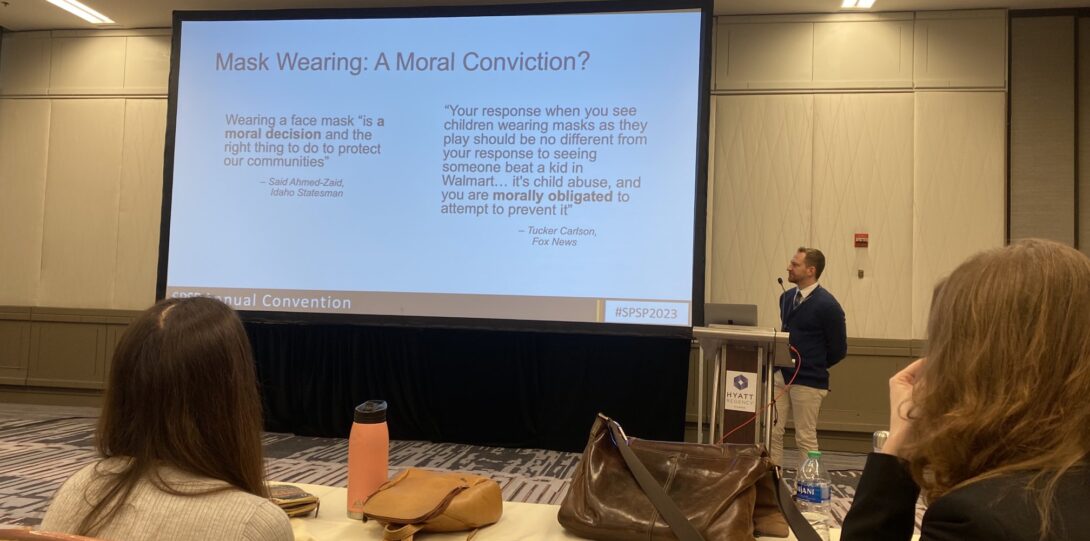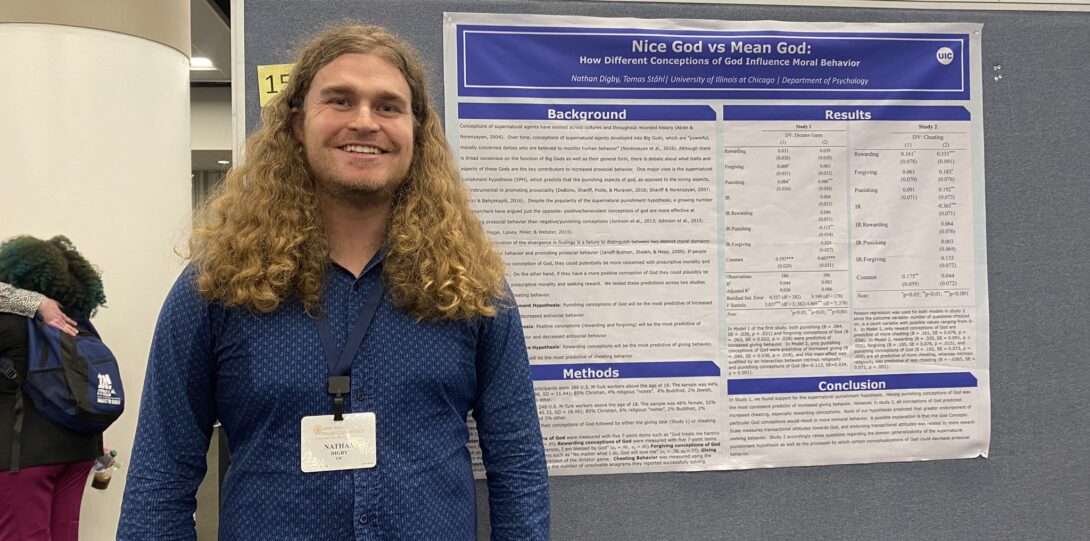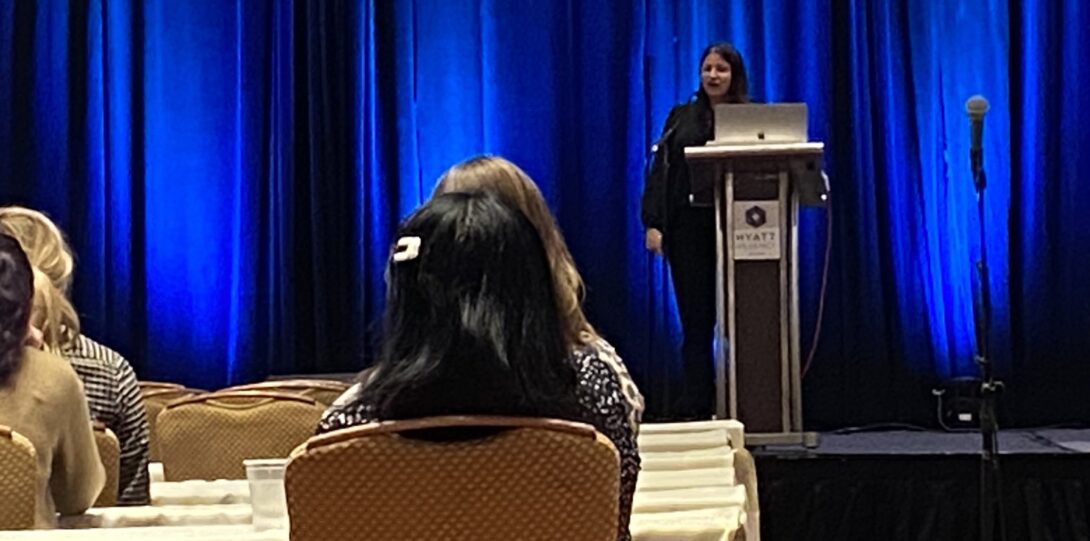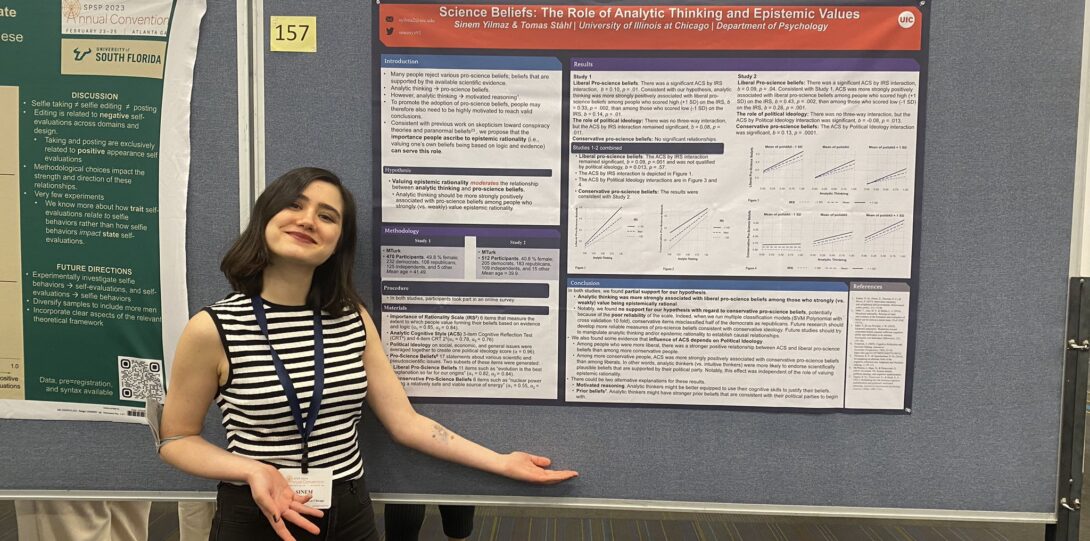Graduate Studies
Welcome to our Graduate Studies page! Our four PhD programs train and equip our students to become leading researchers and scholars in the field of Psychology. With outstanding leadership and distinguished faculty, UIC Psychology has fostered an environment with diverse, equitable, and inclusive practices to support both collaborative and independent research amongst faculty and students to expand networks, scholarship, and create a sustainable environment where individuals from different orientations are valued and respected.
Please Note: We do not require the GRE for admission nor do we offer a terminal or standalone Master’s degree. Students who are admitted into a PhD program will complete a research apprenticeship during their first-year and along with one year of coursework in statistics. After completion of the first-year, students work towards and submit a Master’s thesis by the end of their second year to prepare them for further research and the required qualifying examinations to advance to PhD candidacy by the end of the third year.
Graduate Programs

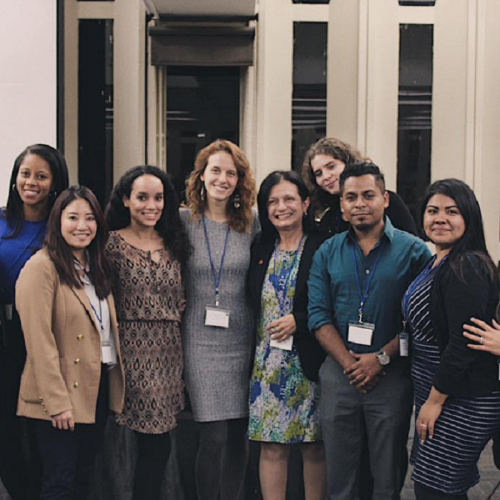


Quantitative Core
The Department of Psychology Quantitative Core is staffed by two faculty members (Ryne Estabrook & Alexander Demos) who primarily teach the Quantitative Course the Department, oversee the requirements for the Quantitative Minor, and run the Statistics and Methods Clinic. By doing original research on statistical applications and making inventive use of already-existing techniques, the Quantitative Core faculty teach students to be experts in a variety of analytical tools and advanced methodology. The core faculty have broad range of expertise in general/generalized mixed-effect modes (GLMM), structural equation modeling (SEM), longitudinal methods, time-series methods, dynamical systems theory methods (DST), and signal processing approaches.
Quantitative Core Required Sequence for the PhD in Psychology
PSCH 543: Research Design and Analysis I: 4 hours. Experimental design, advanced analysis of variance (ANOVA) and statistical analyses for experimental and quasi-experimental designs, interpretation and writing results in APA style, and statistical computing software. Offered every Fall.
PSCH 545: Research Design and Analysis II: 4 hours. Experimental design, and statistical analysis and APA reporting of the General and Generalized Linear Models (e.g., linear, multiple, hierarchical, mediated, moderated, and logistic regression). Course Information. Offered every Spring.
Quantitative Minor Courses after Required Core Sequence:
PSCH 542: Mixed-Effects Models: 3 hours. Statistical methods and practical issues relevant to general and generalized linear mixed effects models with special emphasis on common nested and crossed designs used in psychology. Offered most Fall semesters.
PSCH 544: Structural Equation Modeling for Latent Variables: 3 hours. Statistical methods and practical issues relevant to latent variable models with special emphasis on factor analysis and structural equation modeling. Offered most Spring semesters.
PSCH 547: Data Science for Psychological Science: 3 hours. Comprehensive overview of data science (data wrangling, machine learning, and deep learning) and its application to psychology. Offered every other year.
Addition classes offered by the Quantitative Core
PSCH 541: Statistical Programming in Psychology: 1 hours. An introduction to applications of statistical programming and computing in psychological research. Offered: TBA
PSCH 588: Current Topics in Quantitative Psychology: 1 hours. Discussion based course around the methods used in psychology journals where the data was collected and analyzed by psychologists. Offered: TBA
Minors
Students may complete an optional minor in conjunction with their PhD program to diversify their knowledge and skills aside from their major area and to improve the quality of their scholarship and research. Exposure to a minor is not as extensive as the training in the student’s PhD program, but students are educated on the core literatures, theories, and research methods in their minor area.
There are three types of minors students will have the option to select from and complete. Students will consult with their advisor to construct programs individually tailored to their research interests and career goals.
Programmatic Minors
Programmatic minors are available as an option for each of the four PhD offerings.
Student Designed Curriculum Minors
Students typically justify selection of this minor through a formal proposal to their advisor and major program that indicates how a particular sequence of courses will broaden their scholarly approach to psychology as well as their approach to research.
Special Topics Minor
The Department has three approved Special Topics Minors:
- Diversity Science: This minor is designed to provide students with some depth of training in questions of diversity, using both the expertise of faculty in the psychology department, as well as the vast resources available from the broader UIC community.
- Quantitative: The goal of the Quantitative Minor is to provide students with an extensive tool kit of quantitative skills.
- Qualitative and Mixed Methods: The goal of the Mixed Methods Minor is to provide students with an extensive tool kit of design and analysis skills.
Funding
Teaching and Research Assistantships
The Department of Psychology has made a commitment to support graduate students for at least the first academic year of their study at UIC, with support through the fourth academic year pending funding availability. Assistantships that are 25% – 67% time also include a tuition and fee waiver.
In return for working at UIC as a teaching or research assistant, the University will waive your tuition costs and some University fees. Research Assistantships are available but are dependent on funding sources specific to individual faculty members. Prospective students should consult with faculty members in whom they are interested to inquire about mechanisms of support.
Scholarship and Research
Program Colloquia
The intellectual life of the department is enhanced by weekly program colloquia among the faculty and graduate students. However, each program colloquia are open to all members of the Department.
During the colloquia, faculty and students present their latest research and discuss important scholarly topics in their field. Invited presenters from other UIC departments and Chicago-area universities also enrich the colloquia series. The department also sponsors a colloquium series with presentations by nationally renowned scholars from diverse specializations.
The Black Scholar Series
The Black Scholar Series in the Department of Psychology at UIC is supported by the OVPUAAP’s Student Success Innovation Fund and the College of Liberal Arts and Sciences. This series was created to support the development and increase visibility of Black Scholars in the field Psychology. Scholars are invited to UIC for a day of virtual engagement including a main lecture on the scholar’s work; an affinity session providing dedicated space for Black students to engage with the scholar; and a special session on a selected topic.
Statistics and Methods Clinic
“The Department of Psychology currently has two faculty members (Ryne Estabrook & Alexander Demos) and one graduate TA (Taylor Miller) who have dedicated time to assist in research design, statistical consulting, and help with the interpretation of results. Our goal is to help you do research!
We now have three avenues for help (see below for details).
- Statistics & Methods lab meetings in BSB 1075 (Tuesday, 12:00pm – 12:50pm). To join virtually via Zoom use: Lab Meetings
- Walk-in office hours for help with the TA in BSB 1015 (Thursday, 12:00pm – 1:00pm). For Zoom office hours use: Walk-in office hours
- Private consultation with clinic faculty”
How to get Help:
To help direct you to the appropriate avenue for help, we ask if you want to schedule lab meeting or consult with clinic faculty to first fill out a short Qualtrics form (Note: walk-in TA do not require the form). The clinic TA will review this form, and they will get back to you regarding the next steps. Our goal of this form is to make it easy to keep track of who and when we are assisting so we can spend less time documenting and more time helping you.
Walk-in hour with TA:
Faculty and Grad students can come with questions related to implementation or standard questions about ANOVA/Regression. This is the time to say, “help my code won’t work” or “which contrast is the right one for this ANOVA”.
Details about the Lab Meeting:
Faculty and Grad students can come and ask your design, programming, analysis questions, and all in the room can hear our discussion. All are welcome to attend each week and can just show up. For those who want to work on their data/project or suggest a specific topic, we ask you to fill out the Qualtrics form at least one week in advance to secure a spot (30 or 60 mins).
- Grad students: For example, time to work out an MA/Ph.D. design/analysis plan.
- Lab Directors: Bring your whole lab to discuss anything related to methods you might want a tutorial on.
- If no one signs up that week, we will still hold the meeting for walk-in questions (no sign up necessary) and feel free to bring friends to hear the discussion.
Details about Private Consultations:
Assist in the design of new studies, consult on analysis plans of studies already completed, help with the response to reviewer methods/analysis comments, power analysis related questions, and other methods issues. These meetings will be up to 1 hour long, and if we go over, you will be asked to book the next available meeting time.
- Analysis help: Have the design ready (with all details and if you could visualize it before you arrive that would help).
- Interpretation/Code help: Have datasets loaded and code run (or marked where stuck) and ready to view.
Final Notes:
- Design Help: To quote Fisher, “To consult the statistician after an experiment is finished is often merely to ask him to conduct a post mortem examination. He can perhaps say what the experiment died of.” We want to save you grief, so come before you collect data.
- Analysis Help: Guidance in which techniques answer which questions.
- Milestones: We will help you assess the methods you need for your questions. We can often direct you the resources you will need to learn, and the time it will take for your discussions with your committee.
- Code Help: Between us, we can help with R, OpenMx, Matlab, SPSS, and SAS. We will not code it for you, but we can help.
Other Useful Links:
- OpenMx designed in part by our own Dr. Ryne Estabrook
- JAMOVI Open Source GUI R-based program that has ANOVA, regression, mixed models, factor analysis, mediation, meta-analysis, power analysis, and other modules. It’s all “clickity-clickity”, but you might learn R by mistake.
- JASP Open Source GUI stats program which lets you compare frequentist and Bayesian methods.
- UIC Graduate level ANOVA, Regression and mixed models course lectures on the web
- UIC Graduate regression, SEM and mixed models course lectures on the web
- Grad student-written R-webbook
Resources
Have a question? Contact Us!
Connect with Us!
Error: No feed found.
Please go to the Instagram Feed settings page to create a feed.
